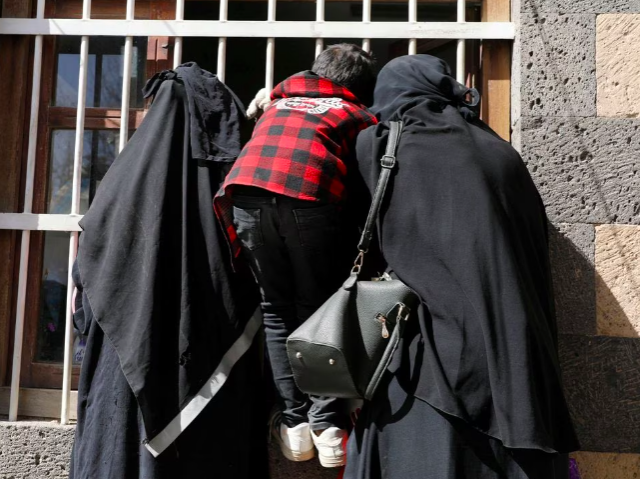Male guardianship rules in north Yemen restrict women's aid work
When women take male guardians, gender-sensitive work is difficult and aid budgets must bear extra costs

Female aid workers in north Yemen cannot do their jobs tackling one of the world's worst humanitarian crises as tightening male guardianship rules by Houthi authorities restrict their movement, nine female humanitarians told Reuters.
When women refuse to take a guardian, they cannot travel to oversee aid projects, collect data and deliver health and other services. When women do take one, gender-sensitive work is difficult and aid budgets must bear extra costs.
One health project manager normally conducts 15-20 visits a year to projects around the country but said she has not made any since the rules requiring Yemeni female aid workers be accompanied by a close male relative - a "mahram" in Arabic – came out a year ago.
"I don't have a lot of men in my family," she said, adding that some women struggle to find willing guardians because relatives are against her working. "Sometimes a woman works without informing someone in her family."
She improvises with video calls, but knows other women have lost jobs because they cannot work effectively.
Yemen's conflict has divided the country between the Iran-aligned Houthis in north Yemen and an internationally recognised government in the south, supported by a Saudi Arabia-led military coalition.
The conflict has wrecked the economy and destroyed the health system, leaving two thirds of Yemen's 30 million population in need of humanitarian assistance. Aid groups say female-headed households are more vulnerable to food insecurity and difficulties accessing aid.
Without female staff in the field, aid groups say they have trouble doing things as simple as identification checks on women, who may need to lift their face veils, to distribute food aid.
"Mahram requirements are making it even more challenging for humanitarian interventions to reach the most marginalised female programme participants," said one representative of an NGO that works on nutrition and sanitation.
Culturally sensitive
For the past year female Yemeni aid workers have had to take a mahram when crossing provincial borders controlled by the Houthi group, a religious, political and military movement that controls north Yemen. In four provinces, they even need a guardian to move within the province.
"Female (Yemeni) staff have not been able to work outside our offices for almost two years which is catastrophic for their development, morale, motivation and also most obviously for us reaching women and girls in the field in a culturally sensitive way," said an employee of another NGO, describing the situation in some areas.
Project quality in the NGO's work on food and health provision has been "very damaged", she said.
The women all requested anonymity due to safety fears.
A spokesman for the Houthis' aid coordination body SCMCHA said they supported aid delivery, but organisations should respect traditions.
"Mahram is a religious Islamic obligation and a belief culture ... Why do organisations put up obstacles to Islamic teachings and Yemeni culture?" he said.
The Houthis, also known as Ansar Allah, follow the Zaydi sect of Shi'ite Islam and have increasingly promoted conservative social values – including controlling clothing - since ousting the government from the capital, Sanaa, in late 2014.
Movement restrictions increased ad hoc before becoming more systematic and targeting aid workers with mahram requirements.
'Discrimination'
The United Nations and governments including the US say the restrictions impact women's ability to participate in public and political life and must stop.
In protest, most international NGOs have refused to include guardians when applying for aid work travel permits - resulting in those permits being declined. NGOs have also suspended travel on UN flights from Sanaa in protest.
"This smothering rule gives men power over women's lives and is an unacceptable form of gender-based discrimination," Amnesty International said.
While women in the Arabian Peninsula nation have long-faced gender inequality due to social and cultural attitudes, Yemeni law has not imposed male guardianship rules, and authorities in the south do not impose them.
"We want to achieve more, to be stronger, more independent. But they restrict that," said one city-based aid worker who cannot monitor distant projects due to a lack of male relatives.
While humanitarians are the main target of mahram rules, directives requesting car hire and transport companies ensure mahram compliance extended it to all women – although these are less strictly applied.
"If women have to travel without a mahram, they are detained at checkpoints and kept until a male guardian arrives," another aid worker said.
The women described taking boy relatives out of school, driving sick relatives around to ensure a man in the car, and last minute meeting cancellations.
"You have the burden to pay for your relative. To pay for accommodation, transportation, food ... It is not cost effective for us or for donors," said a health worker.



















COMMENTS
Comments are moderated and generally will be posted if they are on-topic and not abusive.
For more information, please see our Comments FAQ